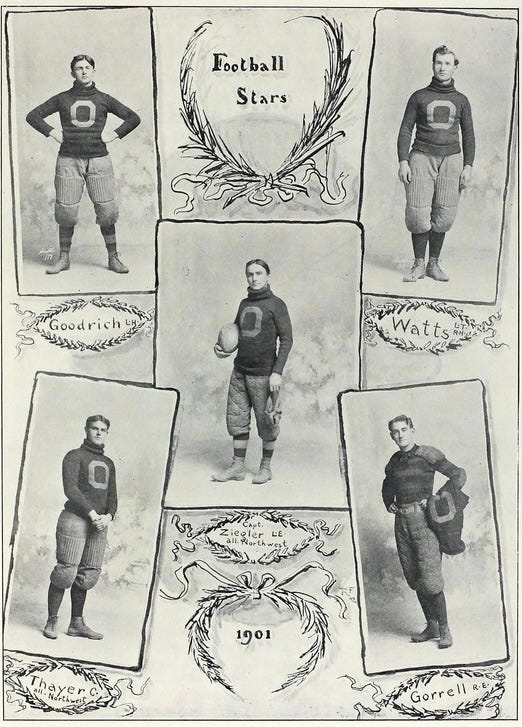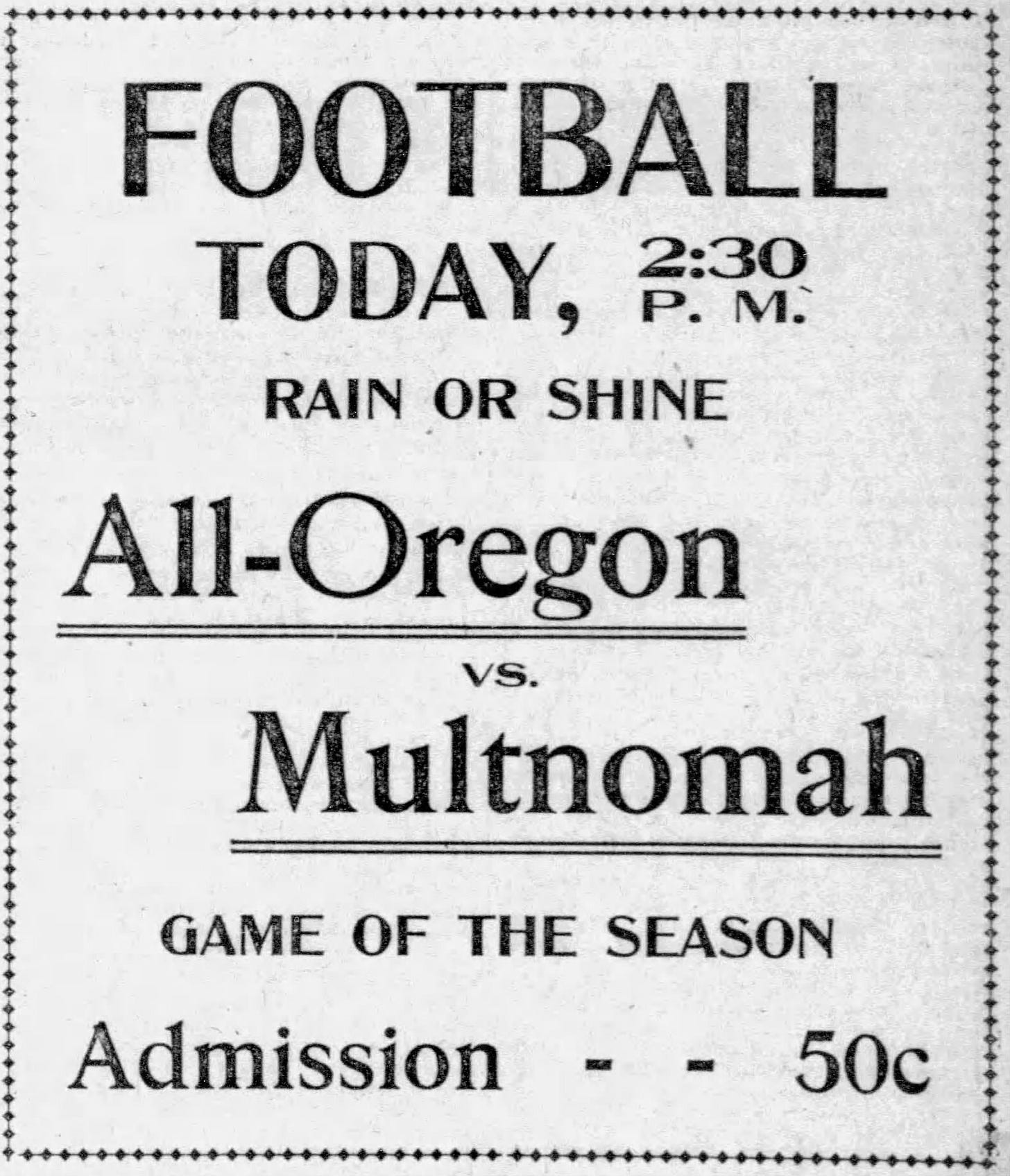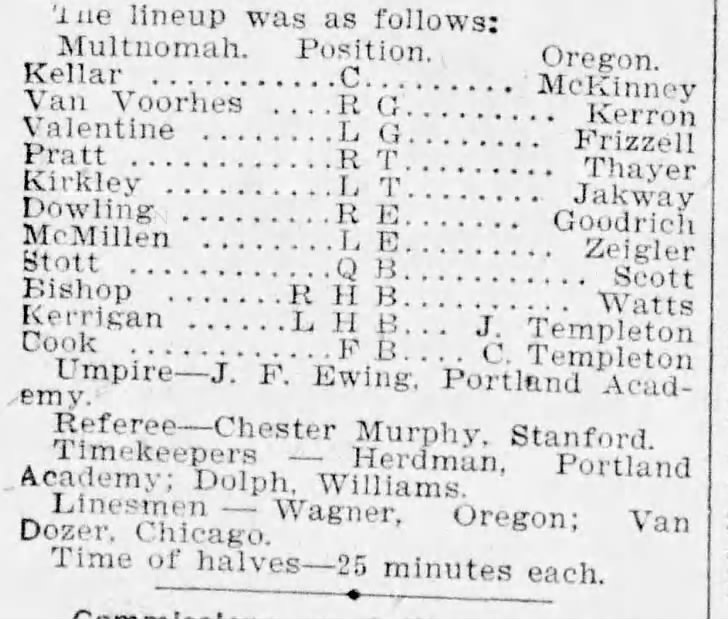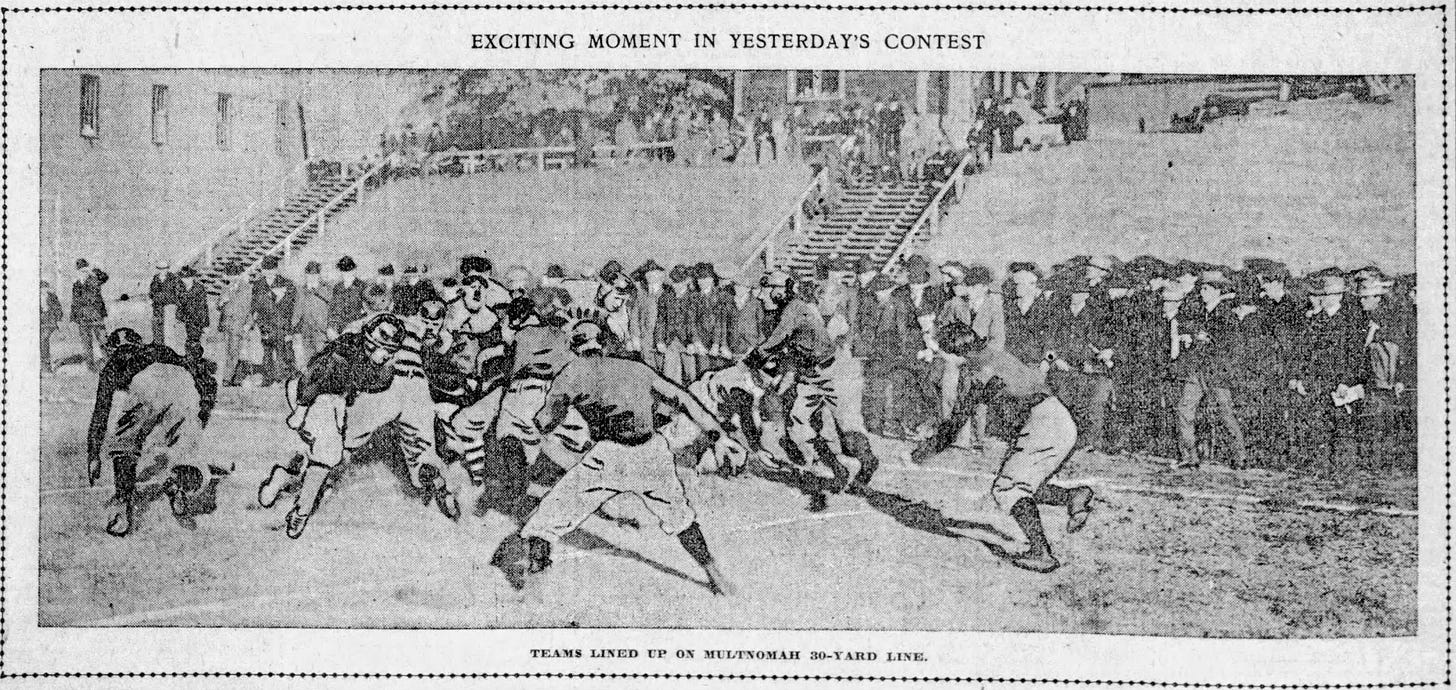The 1902 All Oregon-Multnomah Christmas Game
During the 2024 football season, a social media account reviewed each college conference and its members' oddest historical opponents. The list included many amusing opponents. While many names are entertaining, the lists also show that teams of different stripes intermingled in football days past. Today, football has boundaries that keep high school, college, and professional teams from playing one another. The NFL no longer plays the CFL, town teams, athletic clubs, or semi-pro teams. Few military bases and ships have teams that play outside competition.
TV and radio weren't available back in the day, and transportation challenges limited the number of nearby teams for vast swaths of the country. So, football remained a participation sport after high school more than today. Teams of all sorts played other teams of all kinds at varying levels of seriousness. We don't have the same mix and gradations today.
On Christmas Day 1899, Carlisle met Cal in Berkeley, becoming the second football team to travel toward the setting sun and cross the Rockies. Further north, the Multnomah Athletic Club of Portland, Oregon, played Willamette the same day.
There weren't many college teams in the Northwest then, so Willamette and other college teams often played athletic clubs like Multnomah, which fielded strong teams with former college players for several decades. The athletic club boys defeated the college boys that day and were nice enough to host Willamette for an evening performance of the play Shenandoah.
Multnomah enjoyed the Christmas game in 1899 and arranged to play another game against Oregon three years later. This was 122 years before Oregon became the #1 seed in the college football playoffs.
Oregon finished the 1902 regular season with a 3-1-3 record, beating Whitman, Oregon Medical College, and Pacific while tying Oregon State once and Lewis & Clark twice. Their only loss came against Multnomah on Thanksgiving Day when the Webfoots were stuffed 17-0. The game was one of 20 losses that Oregon suffered against Multnomah over the years, winning 11 and tying three.

Despite the loss, the Oregon players agreed to return for a second game on Christmas Day. Whether some of Oregon's varsity players wanted to spend Christmas at home rather than on the gridiron, the team went to the portal to enhance the flock, adding a few alums and members from the Oregon Medical College squad. As word spread of the improved roster, reporters began referring to them as the All-Oregon team.
The All Oregon team members met in Portland during the week leading up to the game to practice and prepare. The supplemental players not only added better players but improved the undergraduates' outlook:
...the clubmen will find that the old-time stars of the alumni will not only strengthn the 'Varsity team but will instill a spirit of confidence into the younger collegians. The clubmen realize that they are up against a mighty hard proposition, and are practicing faithfully.
'After Multnoman's Scalp,' Oregonian (Portland), December 15, 1902.
Due to rain the days before the game, the clubmen spread sawdust over the field, though it helped little. Each player received a physical examination.
On game day, the teams presented lineups packed with Christmas stars.
Unfortunately for the players and 1,500 fans that attended what some thought would be the finest football game ever played in the Northwest, the game proved unexciting.
The football Christmas tree at the big game yesterday between the Multnomah and All-Oregon teams did not bear a single present for either eleven. For 50 minutes, the 22 players wallowed in the mud, and then the referee's whistle blew and announced a tie contest.
'No Score Made In Big Game,' Oregon Daily Journal (Portland), December 26, 1902.
The game left one reporter in a decidedly Scrooge-like mood as he critiqued Multnomah's play:
There was some decidedly stupid generalship displayed and many left the grounds feeling that a victory was denied this city on account of the bad management of signals.
'No Score Made In Big Game,' Oregon Daily Journal (Portland), December 26, 1902.
Perhaps the reporter bet on the game and lost, but he was especially critical of Multnomah's Cook, who lost several fumbles, including one when only five yards from the All-Oregon goal. Multnomah also turned the ball over on downs several times, while Oregon never did, smartly punting as the situation demanded.
After the game, the All-Oregon players enjoyed dinner at Hill Military Academy, where they stayed during the visit. They then spent the evening as Multnomah's guests at the theater, where the teams toasted and saluted one another between acts.
College players with eligibility remaining do not play in post-season games anymore, though they took the field for the All-Oregon aggregation that day. When Multnomah met San Francisco's Reliance Athletic Club on New Year's Day, the Reliance team added two former players each from Cal and Stanford.
While Oregon does not count the Christmas game as an official university game, it counts in Multnomah's record of 143 wins, 61 losses, and 21 ties, with most games being against college opponents.
Happy Holidays to you and yours!
Football Archaeology is a reader-supported site. Click here for options on how to support this site beyond a free subscription.





Thanks for preserving a piece of the history of this forgotten team! Merry Christmas!